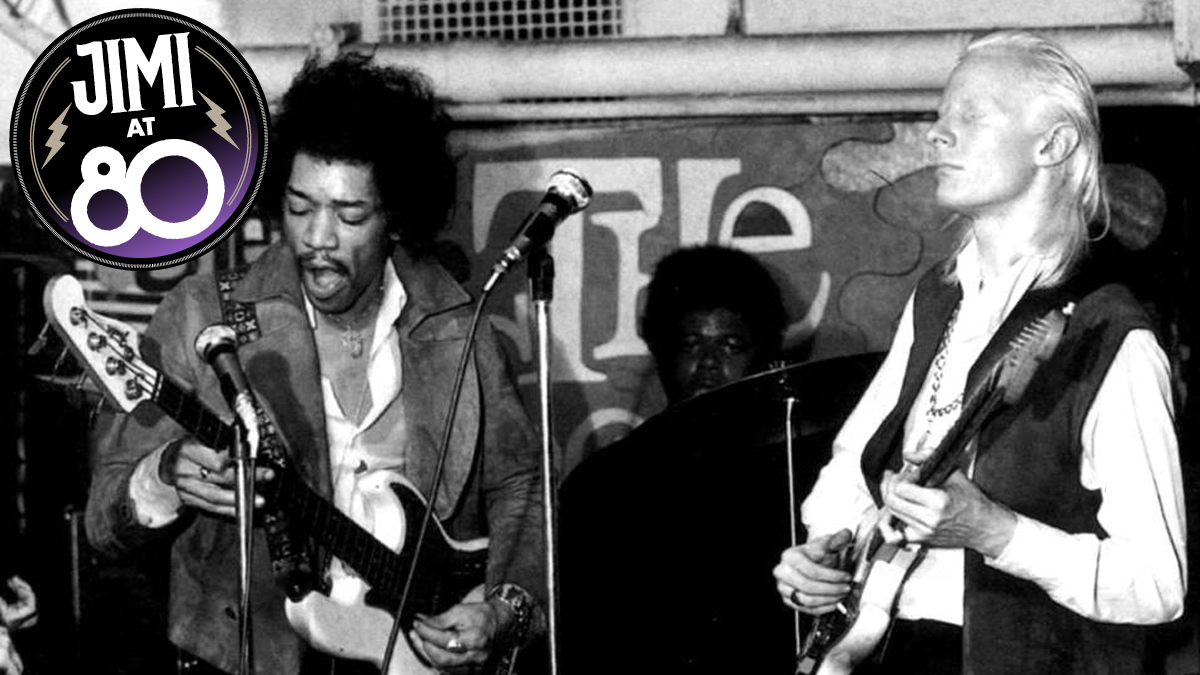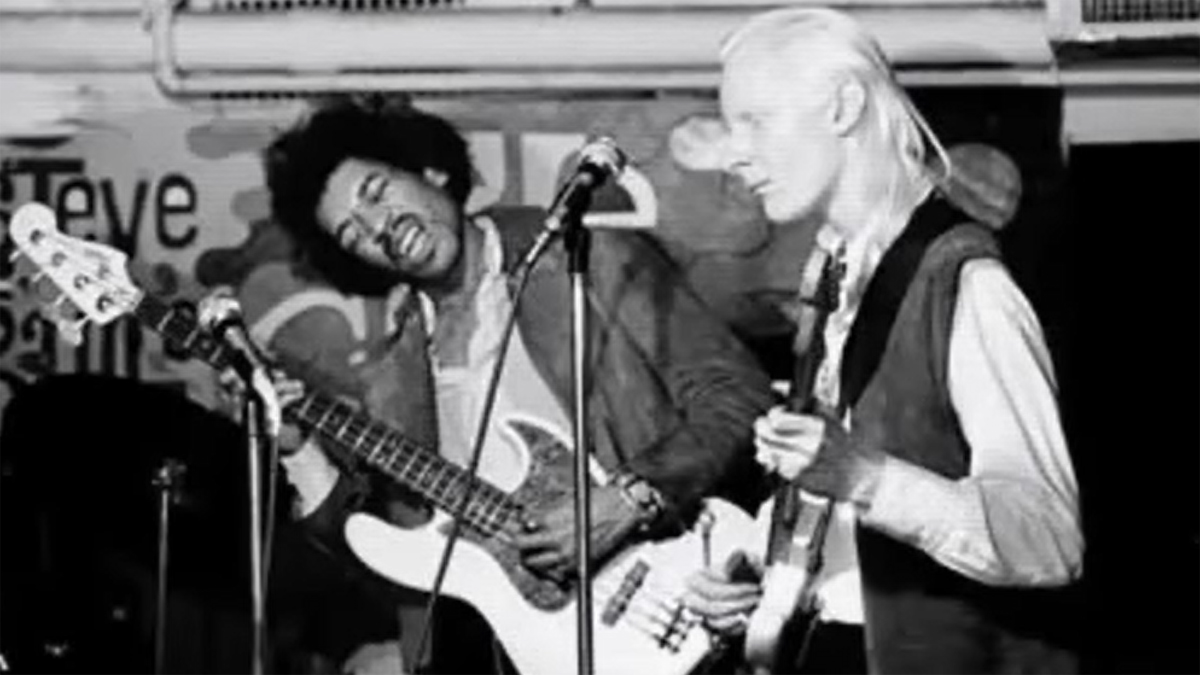Jimi Hendrix was also a master of the bass guitar – he once jammed with Johnny Winter using an upside-down Fender Jazz Bass
The elusive performance took place at The Scene nightclub in New York, and saw the two guitar icons share the stage for an unconventional display of Hendrix's playing powers

Jimi at 80: Born in Seattle on November 27 1942, Jimi Hendrix would have celebrated his 80th birthday this week. Throughout this week on Guitar World, we'll celebrate his genius and game-changing impact on the world of guitar playing.
It goes without saying that Jimi Hendrix is one of the best electric guitar players of all time. One of the godfathers of the instrument who explored and popularized new sounds, Hendrix’s music seeped into just about every musical genre, forever changing the course of blues, rock, psychedelic, jazz and soul.
Indeed, Hendrix and his Fender Stratocaster are seen as one of the most iconic guitar/player combos of all time, and while the totemic titan dabbled with acoustic every now and then, it’s his use of the electric that has gone down in the annals of six-string history.
Yet there’s a side to Hendrix’s playing that often flies under the radar, and that’s commonly underrated by many. Though it’s perhaps unsurprising owing to the seismic impact Hendrix had with his electric guitar, many don’t realize he was also a master of the bass guitar.
His relationship with the four-string, though sometimes sporadic, remained strong throughout his entire career, and had its roots in Hendrix’s early records. However, it was around the time when both Axis: Bold as Love and Electric Ladyland arrived in ‘67 and ‘68, respectively, that Hendrix was arguably at the peak of his bass-playing powers.
Indeed, some of his most notable bass-playing credits occurred between the years of ‘67 and ‘70. In 1970 – just seven months before his death – Hendrix featured on Timothy Leary’s live LP, You Can’t Be Anyone This Time Around. Specifically, he can be heard playing bass on Live and Let Live.
His Leary guest spot was just one of a number of high-profile but underappreciated experiences he had with the four-string in this four-year period. According to John McDermott, Eddie Kramer and Billy Cox – authors of Ultimate Hendrix: An Illustrated Encyclopedia of Live Concerts and Sessions – Hendrix also “cut a staggering number of basic tracks” while recording his cover of Bob Dylan's All Along the Watchtower.
Get The Pick Newsletter
All the latest guitar news, interviews, lessons, reviews, deals and more, direct to your inbox!
It was a similar case for much of Electric Ladyland: with Experience bassist Noel Redding busy with his new band, Fat Mattress, Hendrix took it upon himself to record many of the album's bass parts. Songs such as Have You Ever Been (To Electric Ladyland) and Long Hot Summer Night all showcase Hendrix’s fluid bass technique.
From a live perspective, though, there is one example of Hendrix’s bass playing that stands above all else: his spontaneous live jam with Johnny Winter, which took place at New York’s The Scene nightclub some time in the late ‘60s.

Though there’s little official information surrounding the elusive performance, Winter’s brother, Edgar, recently sat down with Let’s Rock Chats to shed some light on the event, saying Hendrix turned down the opportunity to play guitar and instead elected to pick up a bass.
“There was this club in New York called The Scene that everybody went to,” he recalled. “You’d see the Stones, you’d see the Beatles, you’d see Elton John before anybody knew who he was… all these people.
“Johnny was sitting in and Jimi Hendrix was in the audience,” Winter went on. “And there was like 10 guitars up there [on stage] – Jimi played the bass. He got up there and played the bass. I think that speaks volumes.
“You wouldn’t want to get in a showdown with a guitar slinger like Johnny. I’m not saying that Jimi was afraid to do that, but he did elect to play bass instead of picking up the guitar.”
Some rare audio pertaining to be from the evening in question – with Hendrix on bass and Winter on slide – is available on the internet, though without official confirmation, the authenticity of such clips can’t be taken at face value.
Furthermore, theories that Winter lent his six-string services to Hendrix’s infamous bootleg album Bleeding Heart – supposedly recorded over various dates at The Scene, from which some of these clips are taken – were shot down when Winters emphatically denied having any involvement in it back in 1991.
Despite this, it remains a fact that Winter and Hendrix did indeed share the stage on at least one occasion where the latter wielded what looked to be an upside-down Fender Jazz Bass, quite possibly belonging to Johnny Winter’s own bass player, Tommy Shannon.
Winter wasn’t the only one to be supported by Hendrix on the four-string. In 1969, Hendrix played bass for Mountain’s Leslie West, who once told Guitar World of the experience.
Hendrix's legacy is often viewed from the guise of the electric guitar, and for good reason. His enthusiasm for the bass guitar and the proficiency he had for the instrument in both a studio and onstage capacity, though, should not be overlooked.
- An unreleased live album, Jimi Hendrix Experience Los Angeles Forum: April 26, 1969, is out now on 2LP vinyl, CD and all digital platforms via Legacy Recordings. A new book, JIMI by Janie Hendrix and John McDermott, is out November 24.

Matt is the GuitarWorld.com News Editor. He has a Masters in the guitar, a degree in history, and has spent the last 16 years playing everything from blues and jazz to indie and pop. When he’s not combining his passion for writing and music during his day job, Matt records for a number of UK-based bands and songwriters as a session musician.
“I asked him to get me four bass strings because I only had a $29 guitar from Sears”: Bootsy Collins is one of the all-time bass greats, but he started out on guitar. Here’s the sole reason why he switched
“I got that bass for $50 off this coke dealer. I don’t know what Jaco did to it, but he totally messed up the insides!” How Cro-Mags’ Harley Flanagan went from buying a Jaco Pastorius bass on the street to fronting one of hardcore’s most influential bands










